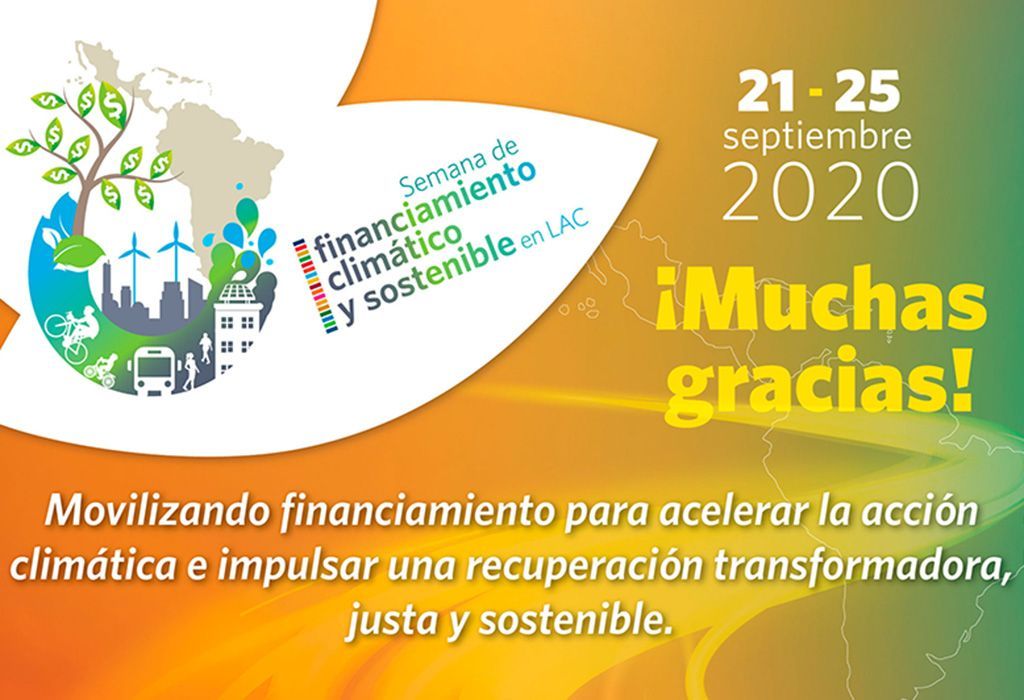The event held September 21 to 25 invited reflection on the opportunities and challenges of climate financing in the context of post-COVID19 economic and social recovery.
October 6, 2020, Bogotá, Colombia. Meeting the objectives of the Paris Accord requires the development of financing mechanisms and investment in projects and initiatives aimed at achieving low-carbon and climate-resilient development.
With this theme in mind, the Climate and Sustainable Financing Week organised by the Climate Financing Group for Latin America and the Caribbean (GFLAC), was held from September 21 to 25. Its objective was to address the challenges and opportunities for climate financing, identifying proposals to mobilise resources for low emission initiatives, and promoting a Green Recovery that is transformative, fair, and sustainable.
This event was attended by various actors in climate action, including representatives of governments, international cooperation, international experts in climate finance and non-governmental organizations.
Consistent with its Climate Finance line of action, the EUROCLIMA+ programme participated in this event. Thus, Bernhard Zymla, GIZ coordinator for EUROCLIMA+, participated in the session "Challenges and opportunities for international cooperation in times of climate and health emergencies". He highlighted that "In order to respond to the current crises, it is necessary for all development aid organisations to align themselves in order to generate greater synergy to achieve recovery and transition of less emission-intensive economies. In this regard, the EUROCLIMA+ programme demonstrates that it is possible to offer added value, as we take advantage of the experiences and comparative advantages of 5 European Union institutions and 2 United Nations organisations to identify fields of intervention and plan projects together with the countries". In his speech, Zymla also highlighted that "green recovery measures have a double impact, on the one hand they allow economic recovery to be promoted and, at the same time, they set the course for sustainable development
Check the complete session at the link
In addition to the above, the EUROCLIMA+ programme, together with the INCAE Business School and the LEDS LAC platform, through its initiatives Course on the Formulation of Bankable Climate Projects and the Community of Practice on Private Sector Involvement in Climate Policy Processes (CoP SP), organized the session "Strengthening the enabling environment for climate financing", a space in which the experiences and lessons learned by these bodies were presented.
This discussion highlighted the need for well-formulated projects that are attractive to the financial sector in order to enable possible NDC implementation. The complexity that climate financial instruments have acquired was raised, underlining the need for a multidisciplinary process for the formulation of projects, and in the realm of the private sector, the involvement of the private sector from the early stages of planning or formulation was highlighted as a determining factor for success, since this allows for the use of its capacity for innovation and for more feasible and even more ambitious goals.
This session was attended by Andrew Scyner, EUROCLIMA+ Programme Manager at the Directorate General for International Cooperation and Development (DG DEVCO); Ronald Arce, training course coordinator at the INCAE Business School, Ana María Majano, COP SP coordinator at LEDS LAC, and Laura Cruz, regional climate finance advisor at GIZ/EUROCLIMA+, Lorena Márquez, UNDP/Green Climate Fund consultant, Uruguay; Arturo Palero, General Coordinator of Climate Change Transversal Management, Jalisco State Government, Mexico, and Virginia Vilariño, Climate and Energy Coordinator, Argentine Business Council for Sustainable Development, Argentina
To review the full session please visit the following link
About EUROCLIMA+
EUROCLIMA+ is a programme financed by the European Union to promote environmentally sustainable and climate-resilient development in 18 Latin American countries, particularly for the benefit of the most vulnerable populations. The Programme is implemented under the synergistic work of seven agencies: the Spanish Agency for International Development Cooperation (AECID), the French Development Agency (AFD), the Economic Commission for Latin America and the Caribbean (ECLAC), the German Society for International Cooperation (GIZ) GmbH, Expertise France (EF), the International and Ibero-American Foundation Administration for Public Policies (FIIAPP), and UN Environment.

